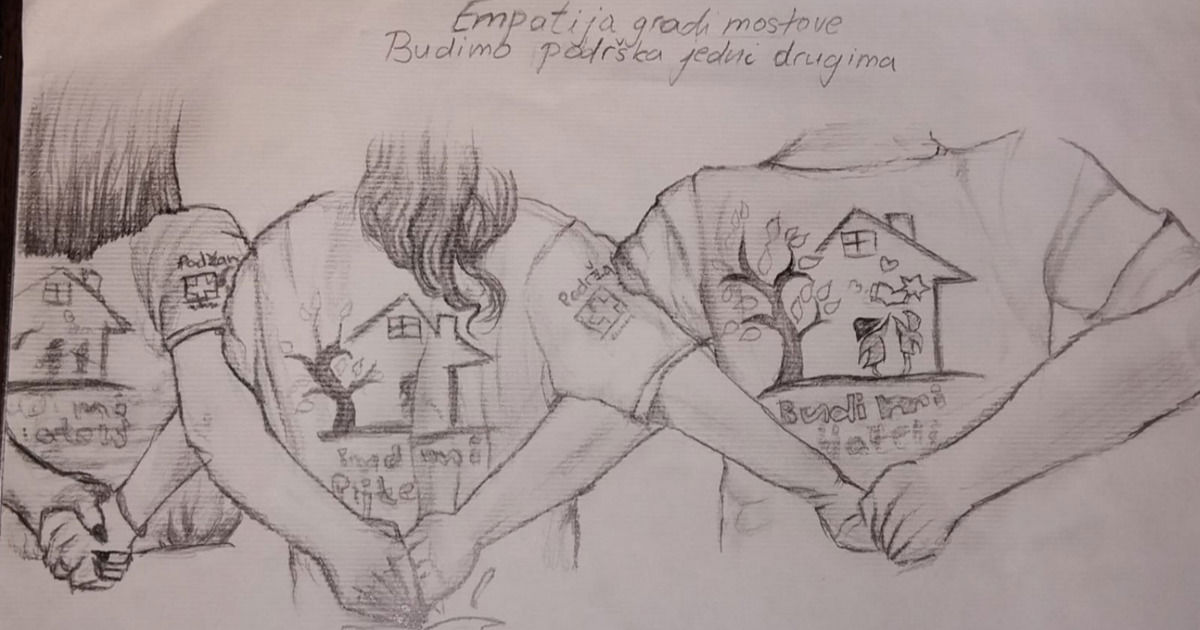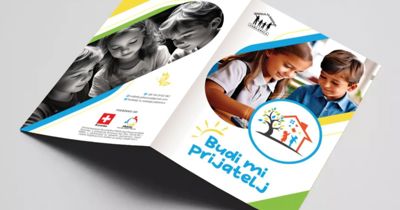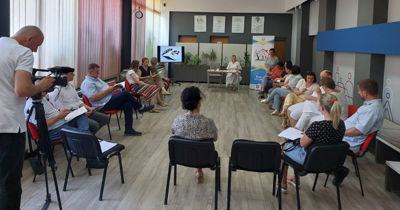
"Only when we focus on their strengths and talents, rather than their shortcomings, will we, as a society, begin to improve", said Edina Husrep, a representative of the association "Budi mi prijatelj" from Jablanica and mother of a child on the autism spectrum. The association "Budi mi prijatelj" has launched an initiative to open an Inclusive Center for children with developmental disabilities in Jablanica due to the great need for such a service.
According to UNICEF estimates, 6.5% of children in Bosnia and Herzegovina aged between two and nine years have some form of disability and belong to a group that is one of the most socially excluded in the country. However, it is assumed that this number may be even higher, as some children have not been diagnosed, meaning their condition has not been recorded anywhere. In order for society to stop viewing children with disabilities as a burden and to begin promoting greater engagement with them so they can reach their full potential, regular work with trained staff is necessary. Unfortunately, the quality of services for children and individuals with disabilities in Bosnia and Herzegovina is quite low, particularly in the sectors of education and healthcare.
When talking about a systemic solution to this issue in our country, it is important to highlight that the system of providing social services, day centers, the application of inclusive education, extended care, and everything that every family with a member who has disabilities needs, is far more advanced and developed in the Republic of Srpska compared to the Federation. The reason lies in the fact that in the Republic of Srpska, this issue has been addressed through laws, and the government has recognized and licensed non-governmental organizations that provide essential services for people with disabilities as partners. On the other hand, in the Federation of BiH, the Ministry of Labor and Social Policy has created a draft law on social services. Now, the cantons are expected to provide their feedback, which will be incorporated into the final version of the draft, which will then be voted on in both Houses (the House of Representatives and the House of Peoples of the FBiH Parliament). As associations in the Federation that work with individuals with developmental disabilities have mentioned, this law might be adopted in 2026, but how should we act until then?
A positive aspect of the mentioned draft law is that it includes and recognizes service centers. According to Ines Kavalec, the president of the "Dajte nam šansu" association from Sarajevo, service centers, of which there are currently seven in our country, are the key and foundation of social reform. "Service centers are a systemic solution, and there should be one in every local community. This is also the most cost-effective way because it reduces the burden on the health and social systems. We all need some form of security in life, and service centers provide that security to parents. This means that a parent who needs to go to the doctor can do so, knowing that their child will be in safe hands with trained staff working on their psycho-physical development. During that time, the parent can take care of themselves and their health. Additionally, they can work part-time and feel valued", says Kavalec. In Zenica, the "Dlan" association has been active for 14 years, bringing together and assisting parents of individuals with cerebral palsy and other disabilities. Selvedin Dedić, the president of the association, has been advocating since 2017 for services provided by centers to be brought closer to the users. He believes that Bosnia and Herzegovina has enough trained personnel, but that institutions lack sensitivity when it comes to people with disabilities. Formally, he says, there is a commitment, but no systemic solution. "Institutions are obligated to allocate funds for 'cold running costs' to ensure that centers can function, while organizations through public calls should secure an increase in both the number and quality of services in their centers. For this, basic operational funds are needed. I believe we have enough qualified staff, but it is essential to pay them appropriately. We do not have permanent funding, and we always depend on someone's goodwill. What we are advocating for is for the Canton to take over the financing. There are seven service centers in Bosnia and Herzegovina. In these centers, we are doing the work that institutions should be doing. I ask, how long will this continue? We have great importance, we do their work, and they do not recognize it", Dedić emphasizes firmly.
In order for the situation to be more favorable in practice for people with disabilities, non-governmental organizations (NGOs) are doing what the system lacks. If our governing structures recognized the significance and contribution of NGOs, the system would be much more effective. For example, many parents of children with disabilities want to work, but the system does not allow them to do so. In this regard, the "Dajte nam šansu" association, with its service and day centers, has made a significant leap for families of children with disabilities and has greatly eased their lives. "With these centers, we have succeeded and proven that we have reduced the number of divorces because it was recorded that the divorce rate among this population was 70%, and now that number has decreased. We managed to help parents avoid placing their children in closed institutions. In this way, we gave them the opportunity to at least work part-time, feel useful, and contribute, which boosted their self-confidence", explains Kavalec. The "Dajte nam šansu" association was founded in 2011, with the guiding principle of providing support to the entire family with a member who has a disability. With the help of USAID, they opened the first Service Center in Bosnia and Herzegovina in Sarajevo in 2014. Initially a pilot project, it has since evolved into two service centers and one Day Center in Sarajevo, as well as service centers in Zavidovići, Zenica, Banja Luka, Foča, and Trebinje. All centers operate under the same model and provide a total of 14 different services, all completely free of charge for users.
Since the issue of social protection for people with disabilities has not been systematically addressed, the care for this population is managed by associations and civil society organizations. As a result, financing is also not fully regulated, as the work of these organizations is often dependent on the goodwill of donors and funders. Due to the poor financial situation, Selvedin Dedić is announcing possible radical actions if things do not change. "Soon, 'Dlan' Zenica will start protests. I am doing everything I can to have the Canton take over the financing, and we will see how that goes", says Dedić. "I think this is a test for our system—will they take away from parents what means everything to them, or will they systematically and legally resolve it so that parents have a foundation, which are the service centers that are already a finished product", says Ines Kavalec.
Despite the selfless efforts of numerous associations and organizations that are trying in every way to ease the lives of families with members who have developmental disabilities, there are still a large number of parents who are left to fend for themselves because there is no one in their local community to turn to. There are no institutions like those available for typically developing children—such as kindergartens or extended care programs. In these institutions, children develop and are educated while parents have the freedom to earn a living and care for their family. Currently, as our interviewees point out, families with a child with disabilities are often viewed as a burden to society. Unfortunately, parents are often forced to give up their jobs in order to take care of their child with a disability. In order to improve the quality of life for entire families with members who have disabilities, associations are being organized, each in their own way, to assist and ease the lives of children with disabilities and their families. One of the youngest such organizations is "Budi mi prijatelj" from Jablanica, which has initiated a project to open an Inclusive Center in their local community. The idea is for trained staff to work with children with disabilities in the center, while parents can use this time for themselves. Furthermore, the Inclusive Center would be a place where parents could talk to each other, exchange experiences, and find comfort in each other’s company, as they understand each other best. A positive development is that the Jablanica Municipal Council has allocated 20,000 KM in the 2025 Budget for the establishment and operation of the Inclusive Center. The members of the association are now waiting for the municipal authorities to hand them the keys to the premises so they can begin their work. The fact that there are other communities in our country that are empathetic and responsive to the needs of families with children with disabilities is demonstrated by the West Herzegovina Canton. They have allocated 568,000 KM in their 2025 Budget for the "Current Transfer for the Education and Training of Children with Developmental Disabilities." Specifically, these funds are intended for the education and training of children with developmental disabilities in preschool institutions, at the "Maria, Our Hope" Home for children with physical or mental disabilities, and for co-financing the work of assistants in preschool institutions.
It is exactly these types of institutions that provide the opportunity for parents to have time for themselves while their child is in the safe hands of professionals who are responsible for their progress and development. Parents can also have the chance to get employed and earn a living, and this is the very purpose of service centers—empowering families, strengthening their mental well-being, providing opportunities for them to be economically independent, and helping them feel valued and useful, which ultimately leads to a happy family. And that is why it is unquestionable that every local community should have its own service center. To make this happen, empathy from governing structures at all levels of government— from local to national—is essential.






